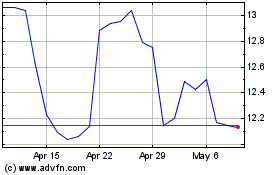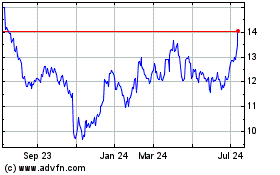By Adrienne Roberts and Chester Dawson
President Donald Trump proposed to executives from the world's
biggest auto makers Friday imposing a 20% tariff on vehicles
brought into the U.S. and also subjecting imports to tougher
emissions standards than domestic vehicles, according to people
familiar with the session.
During a tense meeting at the White House that was billed as a
discussion of U.S. auto-emissions standards, Mr. Trump brought up
the issue of trade and targeted European auto makers for not
building more vehicles in the U.S., according to the people briefed
on the meeting. He then proposed a 20% tariff on imported cars,
which he also suggested would be subject to Obama-era emissions
regulations, the people said.
The president's comments added to the list of Washington policy
changes the auto makers are now processing. The administration is
considering new emissions standards that could clash with those in
California and is in the midst of negotiating a rewrite of North
American Free Trade Agreement rules that govern which cars and auto
parts can be traded within the bloc without incurring duties.
A spokeswoman for U.S. trade representative Robert Lighthizer
referred questions about the matter to the White House.
Industry officials were guarded in their reaction. "We thank
President Trump for inviting us to the White House to discuss the
automotive sector. He is passionate about our industry and we
appreciate his interest and shared commitment to American jobs and
the economy," said John Bozzella and Mitch Bainwol, the heads of
the Association of Global Automakers and the Alliance of Automobile
Manufacturers, respectively, in a joint statement.
Mr. Trump has rattled car executives dating back to his
presidential campaign, questioning their commitments to U.S. jobs
and threatening stiff border taxes on Mexican imports. Auto makers
have responded by highlighting U.S. commitments and, in some cases,
changed foreign investment plans. Mr. Trump has touted industry
announcements, even some that were long-planned and not necessarily
responses to his criticisms.
Mr. Trump has repeatedly singled out autos -- a major part of
U.S. trade -- in warnings about potentially imposing tariffs. This
year he said cars from the European Union could face tariffs if the
EU retaliates against U.S. duties on steel and aluminum imports.
Trade experts say it would be difficult to enact extra tariffs on
car imports without violating World Trade Organization rules.
Under WTO agreements, cars imported to the U.S. are subject to
2.5% tariffs, with trucks subject to 25% tariffs, unless the U.S.
has a free-trade agreement with the country exporting the
vehicles.
During the Friday meeting, which was closed to reporters except
for opening statements, administration officials said they would
work with California on the emissions issue as the administration
moves to ease Obama-era federal rules. The companies welcomed that
message, as they are hoping to avoid a dual system that included a
national standard and a California standard.
The state has an Environmental Protection Agency waiver allowing
it to set its own standards. Many other states follow California's
lead, a coalition that makes up a sizable portion of the U.S. car
market.
Mr. Trump began the meeting by threatening litigation against
California, but in an about-face, later in the meeting said EPA
Administrator Scott Pruitt and Transportation Secretary Elaine Chao
would be tasked with striking a deal with California.
One person with knowledge of the meeting said the Big Three
Detroit auto makers stayed behind at the end of the session after
the foreign auto makers left. It was unclear what was
discussed.
At the beginning of the meeting, the president urged the
companies to build more cars in the U.S., saying they should "build
them here and ship them overseas." He singled out Sergio
Marchionne, the chairman and CEO of Fiat Chrysler Automobiles NV,
for praise and lauded the company's plans to move a facility to
Michigan from Mexico.
"That's what we like," Mr. Trump said. "Right now, he's my
favorite man in the room."
He also credited the law overhauling the U.S. tax code that he
signed last year for increasing auto manufacturing in the U.S.
On the emissions issue, auto makers say the current standards
for their vehicles are too rigorous and don't reflect consumer
demand for fuel-thirsty trucks and sport-utility vehicles that now
eclipse 60% of U.S. sales. But they have voiced concern that the
rollback being pushed by the White House is so extensive that it
will cause more problems than it seeks to solve.
"The administration will soon issue a range of proposals for
future fuel economy and greenhouse gas regulations, and we look
forward to reviewing their notice of rulemaking and providing
comments along with other stakeholders," Messrs. Bainwol and
Bozzella said in their statement. "We also appreciate the
president's openness to a discussion with California on an
expedited basis."
Separately, Mr. Trump during the opening again assailed Nafta,
and the subsequent discussions with car executives were expected to
provide an opportunity for vehicle manufacturers to sound out the
president on proposed changes to the agreement's auto rules.
The U.S. now wants vehicles and significant components that move
across the Nafta region to have at least 75% North American content
to avoid duties when crossing borders, down from a previous
proposal of 85%. The current trade pact sets the so-called
rules-of-origin threshold at 62.5%. The Trump administration also
has dropped a previous suggestion that vehicles be made up of 50%
U.S. content to pass through borders duty free.
Detroit's auto makers and other vehicle manufacturers have moved
significant amounts of production to Mexico, and had grown
concerned that drastic changes to Nafta would upset their business
plans and potentially force higher prices on consumers.
According to Mr. Bozzella's group, international auto makers
built more than 5.1 million cars and trucks in the U.S. in 2017,
just under half of all light-duty vehicle production
nationwide.
--Mike Spector and Mike Colias contributed to this article.
Write to Adrienne Roberts at Adrienne.Roberts@wsj.com and
Chester Dawson at chester.dawson@wsj.com
(END) Dow Jones Newswires
May 11, 2018 20:13 ET (00:13 GMT)
Copyright (c) 2018 Dow Jones & Company, Inc.
Ford Motor (NYSE:F)
Historical Stock Chart
From Mar 2024 to Apr 2024

Ford Motor (NYSE:F)
Historical Stock Chart
From Apr 2023 to Apr 2024
